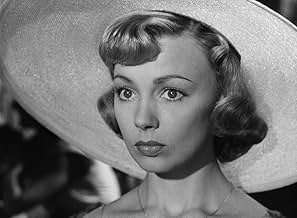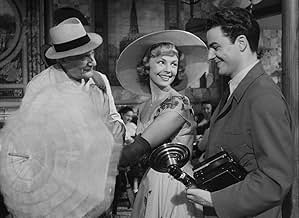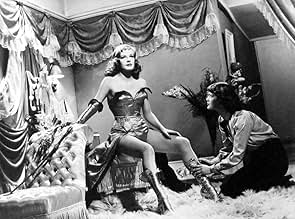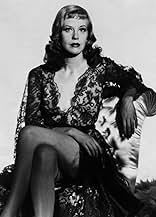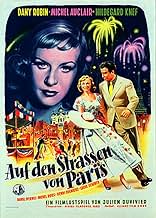Añade un argumento en tu idiomaAfter the rejection of their latest--preposterous--scenario, two scriptwriters get back to basics to prepare a new movie. The new scenario centers on Henriette, a pretty, lively Parisian, an... Leer todoAfter the rejection of their latest--preposterous--scenario, two scriptwriters get back to basics to prepare a new movie. The new scenario centers on Henriette, a pretty, lively Parisian, and how she spends the 14th of July in Paris with her fiancé. We follow the tribulations of ... Leer todoAfter the rejection of their latest--preposterous--scenario, two scriptwriters get back to basics to prepare a new movie. The new scenario centers on Henriette, a pretty, lively Parisian, and how she spends the 14th of July in Paris with her fiancé. We follow the tribulations of Henriette as various other characters enter the story and turn a traditional festive day i... Leer todo
- Dirección
- Guión
- Reparto principal
- Rita Solar
- (as Hildegarde Neff)
- Un scénariste
- (as Louis Seigner de la Comédie Française)
- …
- Un faux déménageur
- (as J.L. Le Goff)
- Dédé
- (as J. Clarieux)
Reseñas destacadas
I won't get into a discussion of Duvivier's place in cinematic history, nor whether we needed the New Wave or not, nor even the use of film-within-a-film. I will just say that this is a very inventive and charming little comedy that really should be on DVD. There is a tremendous virtuosic sequence about 60 minutes in--Marcel tries to rape Henriette in a car, she escapes and he chases her up the stairs in a building under construction--that must be seen to be appreciated.
The performances are delicious with Dany Robin at her most enchanting whilst Georges Auric's scintillating score, Roger Hubert's camerawork and the cutting of Duvivier's editor of choice Marthe Poncin, notably in the splendid chase sequence, contribute to the creation of an overlooked Gallic gem.
On the principle that bigger is not necessarily better, it is probably kinder to pass over in silence Richard Quine's expensively mounted but leaden remake.
"La Fete à Henriette" did not come out of the blue:it's the son of "Sous le Ciel de Paris" one of his most extraordinary achievements.I will try and explain the connection:the 1951 work was made of little stories ,subplots -"Magnolia" was not that much an innovation for that matter- and Duvivier already displayed a compassion for his characters ,he was some kind of puppet master ,a God in miniature who was fascinated by the whims of fate.
"La fete à Henriette" is at first a more demanding -less entertaining maybe -,more free-form ,but when you've watched it ,all you have got to do is stand and applaud.There are many more ideas and innovations than in ,say,Truffaut's "day for night" ("la Nuit Américaine").
Two scenarists see their last screenplay banned by the censorship .That 's why the movie begins with ???? and ???? and ????? in lieu of cast and credits.They've got a whole screenplay to write,and according to the mood they are in,"La Fete à Henriette" will be in turn romantic,dramatic,zany , satirical,you name it.Henri Jeanson lets his inspiration flow and his lines,his ferocious lines never lose their bite ( A VIP from the French government is about to die and the journalists around the mansion are exchanging nice lines such as: "the ideas he has! dying on the 14th of July! or "Hope he 'll kick the bucket before aperitif time!")
It is Henriette 's fete ,the 14th of July ,French Bastille Day!A gorgeous girl ,played by the young romantic female lead of the era ,Dany Robin (most of the users saw her in Hitchcock's "Topaz"),has a fiancé , a photograph who has a -professional,that's what he says that is- rendezvous with a glamorous horsewoman (Hildegarde Kneff).Henriette is cross and she starts to flirt with the first to come .That character whose name is subject to several changes is played by highly talented Michel Auclair.The narration is not linear ,since Auclair's character is now a crazy person fresh from the asylum (and Jeanson gives one of his best anti-militarist lines ever- Auclair to a general:"you see me and you do not stand to attention!),now a b..... who tries to rape the heroine,now a hoodlum with a big heart,now a wealthy family's son....The whims of fate! Duvivier himself reveals as he never did in this work:although it's meant to be a "happy" tale,his legendary pessimism resurfaces now and then.
Duvivier's style is constantly superb and the camera work is dazzling.When the story (ies) become(s) too far-fetched ,the scenes are filmed obliquely.The plot often stops since the two writers do not agree and they have endless discussions about what will happen next.They even quote their colleagues: one of them mentions the script (a news item in the paper he's reading ) of "ladri di biciclette " ("That would not make a good film!") ;later they will parody Marcel Carné as they introduce for a short while a blind man who epitomizes ...fate of course (remember "les Portes de la Nuit").Even the last scene of the fireworks verges on a spoof on romantic drama.You can go as far as to write that Duvivier appropriates René Clair' s "Quatorze Juillet" ,but he effortlessly beats his predecessor at his own game.
Expect the unexpected and till the last pictures! The unexpected final twist is witty and as the cast and credits finally appear after the final "revelation" ,we feel how much "Henriette" was ahead of its time,not only because it was remade by Richard Quine in the sixties ( the so-so " Paris when it sizzles) but because many of its strokes of inspiration we found them back in such later works as Michel Drach's "Les Violonsdu Bal" (the subject has nothing to do with "Henriette" but it imitates the ending)or Peter Weir's "Truman Show".
Did we need the Nouvelle Vague so bad when we had a great director like Duvivier?A writer like Jeanson? WE DIDN'T!!!!
The fifties, between the great age of European film in the twenties and early thirties and the renewal of its traditions with the "new wave" movements of the sixties, was in some respects the time when US and European film traditions were at their most compatible. Since the advent of the talkies, compounded by the disaster of the war, US film-style might be said to have been triumphant, less so in Italy (neo-realismo and commedia all'Italiana) but distinctly so in Germany (whose cinema industry had been ruined by Hitler) and France (what the "new wave" would sneeeringly call "the cinéma de papa").
Yet, even at this low tide of European film, the comparison between these two films provides a useful gauge of the huge gulf that still divided European film (at its best) from the programmed mediocrity of Hollywood.
Quine's US film simply does not begin to comprehend the concept behind Duvivier's film. French wit is replaced by a distasteful vulgarity (just as the elegant score by Georges Auric is replaced by the muzack of Nelson Riddle). William Holden was at something of a lowpoint in his career but Audrey Hepburn (who had made Breakfast at Tiffany's in 1961 and Charade in 1963 and would appear in My Fair Lady this same year) would have seemed an ideal casting. Noel Coward does a very camp comic turn and there is an array of stars (Curtis, Dietrich, Sinatra) playing cameos. But nothing can redeem the film.
The French film offers a multi-layered experience where different levels of "reality" are juxtaposed - the entertaining frame-story of the two scenarists, the provisional (and ultimately rejected) ideas for the film to be written (all in practice suggested by one scenarist), shown sharply angled on the screen and what may be the final film (all in practice the work of the other scenarist). From the censorship that has ruled out the original film (that scene with the bishop and the young girl) to the various sensational suggestions made my scenarist A to the final script as devised by scenarist B, there is satirical comedy on every level and some interesting insights into the way a film scenario is constructed. The elements of parody work well (with an excellent recurrent gag about problems of disposing of bodies). There is immense charm in every moment of the film.
What is more, the frame story remains the frame it should be and the film within the film is actually written, which symbolically receives its credits (missing at the beginning) at the end.
The US film is a falsely sentimental story about a middle-aged drunk using the writing of a scenario as a pretext for seducing a young secretary and her not very strenuous attempts to resist. The incidental "satire" (of avant-garde film-making, of "method" acting) is sour and hamfisted and the parody (westerns, horror, war films, musicals, crime) is crude and rudimentary. The film is as entirely charmless as a film with two such charming stars could be.
The frame story (not much of a story) becomes effectively the film (another in the sequence of Hepburn's romances with older men) and the film within the film (a very truncated version of the original filled out with typical sixties kitsch) becomes of little interest.
It is almost exactly as though the US director has watched the French film and deliberately decided to reject everything in it of value.... 1964 was not a good time for US film (but nor was 1952 for French film) but whereas Duvivier was still able to produce a fine intelligent film, Quine's effort merely emphasises how difficult the hidebound US industry was finding it in the sixties to review its practice in the light of new ideas or to compete with the revolution by then occurring in the European film industry.
First. I was always (since its release) very fond of "Le Magnifique" (1973), almost the only Belmondo one I love (I wrote/detailed the French Wikipedia article). It's the story of a writer (Belmondo) who writes a spy/thriller book, who meets a beautiful student lady (Bisset), who encounters problems with his publisher and who, finally, mixes all these elements in his book. It means we movies goers can watch two stories with the very same actors, in the real world and in the book. Without any doubt (imho), "Le Magnifique" is one of the ten best French comedies ever.
I was indeed very in love with the idea of throwing the reality in the fiction. Of course I knew it was not the first time some Mise en Abyme was put in a film but it was obviously the first time with a writer avenging his poor real life in his books.
Second. Then, recently, TCM Europe showed a lot of Audrey Hepburn movies I never saw. Among them was "Paris - When It Sizzles" (1964), with William Holden. Right after a few minutes I knew for sure where the idea of "Le Magnifique" came from! Holden plays a screenwriter who is very late in delivering his next opus and Hepburn is sent to him in Paris by the Hollywood producer to speed up the writing. Besides the predictable love story, the film divides itself in two parts, their reality and the fiction they're writing together and Hepburn (150% fabulous as always) and Holden play the four characters. The movie is real fun end very entertaining and very intelligently conceived.
Third. Knowing a new gem like this "Paris", I read on the net (en.wikipedia for instance) everything I could about it, whoa, just to learn it was an adaptation of a French movie, "La fête à Henriette" (1952). By chance, there was some discussion about it on an IMDb board and, as wrote user Benoît A. Racine in his comment, "A pen pal from the IMDb was good enough to send me a VHS copy of this French classic unavailable in America." I got a DVD instead he he and, as well, the film is not watchable in Europe. Many thanks again to "him" for his help and his sending to me the Duvivier one.
I finally watched it and noticed all converging points between "Paris" and "Henriette". Let's say "Henriette" is much more conceptual and less entertaining than "Paris", more of a game with the spectator and less of a logical story form A to Z (it's not its goal anyhow). Clearly the biggest difference with "Paris" and "Le Magnifique" is the fact that the actors of the reality (the writers of a script and their numerous secretaries) do not play in the fiction. The main point according to me is really: more conceptual.
Besides, it's pretty fun to see some actors (Auclair, Seigner, Roux) quite young in "Henriette" because they were known at that time and later more as second range stars: their true career came later, in the movies or on the stage. Robin was an important star in the 40s and 50s.
If you want to learn more: Reading over here all comments by reliable IMDb users rastar-1, dbdumonteil, writers_reign and Benoît A. Racine will bring you everything relevant you need about the movie: the plot, the style, the inventive director, the great actors, etc.
Finally, I have to confess I have not seen a lot of Duvivier's movies: I know very well "Marianne de ma jeunesse", which is a very special story, plenty out of time, deeply concerned with poetry and fantasy; I know as well the two "Don Camillo" he made with Fernandel; "La Femme et le panting" with Bardot from a book by Louÿs I read; "La Belle équipe" with Gabin... and it seems to be all. To bad because only "Marianne" and "Henriette" show he is a very important director in history, much more than most of the Nouvelle vague ones, and who was a visionary. Very worth to see, both the movie and any other film by him. "Henriette", a must see!
¿Sabías que...?
- CuriosidadesFrench censorship visa # 13195.
- Citas
Un scénariste: What if we simply told a love story?
Un scénariste: Between two women?
Un scénariste: Between two women?
Un scénariste: What? Between two men?
Un scénariste: Idiot!
Un scénariste: Between who and who then?
- ConexionesReferenced in Kedamono no iru machi (1958)
Selecciones populares
Detalles
- Duración1 hora 58 minutos
- Color
- Mezcla de sonido
- Relación de aspecto
- 1.37 : 1
Contribuir a esta página


